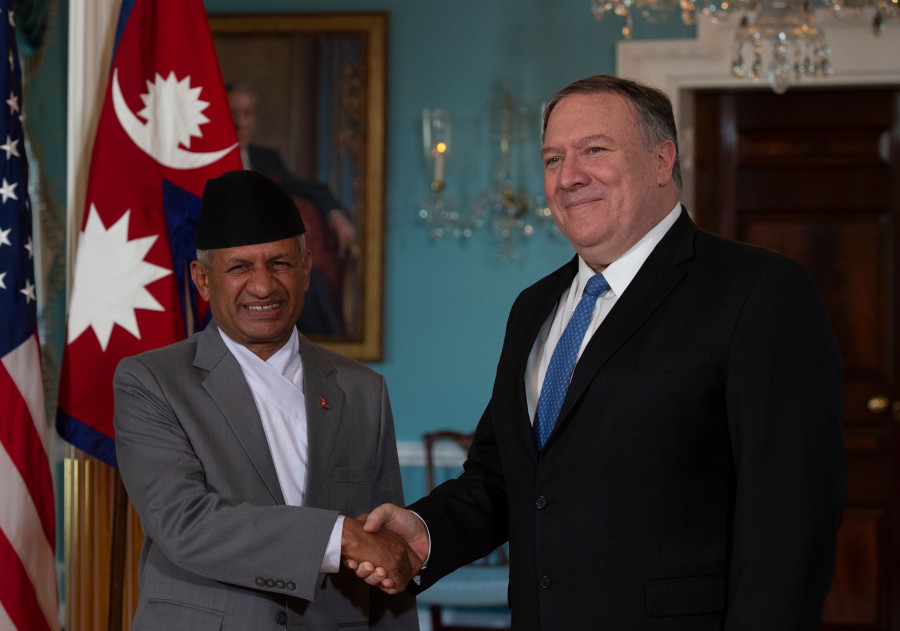Tue, Mar 3, 2026
Miscellaneous
US says Nepal is part of its Indo-Pacific strategy
United States officials have said Nepal is a part of their ambitious Indo-Pacific strategy, a new strategic initiative undertaken by the Trump administration that focuses on developing opportunities across a range of issues across the broader pan-Asian region.
bookmark
Anil Giri
Published at : December 20, 2018
Updated at : December 20, 2018 17:25
Kathmandu
United States officials have said Nepal is a part of their ambitious Indo-Pacific strategy, a new strategic initiative undertaken by the Trump administration that focuses on developing opportunities across a range of issues across the broader pan-Asian region.
The announcement was timed with the visit of Foreign Minister Pradeep Gyawali to Washington, where he met with US Secretary of State Michael R Pompeo. In a statement released by the State Department on Tuesday, Robert Palladino, the deputy spokesperson, said Nepal’s “central role” in a free, open and prosperous Indo-Pacific among others was discussed during the meeting between the two leaders.
But Nepali officials downplayed the announcement made by US officials, saying that Nepal had not taken a decision to participate in the US-led strategy, which is seen by foreign policy experts both in the United States and Asia as a counterbalance to the growing Chinese clout in East and South Asian regions.
Contrary to the statement released by the State Department, the Nepali Embassy in Washington did not mention the discussions about Nepal’s role in the Indo-Pacific strategy. According to the Nepali statement, Nepal and the United States have agreed to widen and deepen their seven-decade-long partnership and take their relationship to the next level.
Foreign policy experts say that Nepal’s involvement in a new geo-strategic initiative aimed at countering China could invite friction between Beijing and Kathmandu, especially because Nepal is a signatory to China’s ambitious Belt and Road Initiative.
Following the State Department’s statement, former Foreign Secretary Madhu Raman Acharya said the United States appeared to want to induct Nepal in its “strategic sphere.”
“Nepal’s diplomacy must have achieved new heights to play a “central role” on such issues as Indo-Pacific and North Korea, especially if the Deputy Spokesperson of the U.S. Department of State is saying so!” he wrote on Twitter. When asked what it means for Nepal, Acharya had words of caution. “Major powers are trying to induct Nepal in their strategic ambit but we should be careful.”
Before leaving for the United States to hold talks with his US counterpart, Gyawali told the Post that Nepal would secure its interest without compromising on its national interest while forging a strategic partnership with global powers. “We want to conduct independent foreign policy and will partner with global powers based on our interest but won’t align with anyone.”
Meanwhile, government officials in Kathmandu said they were not aware of the new initiative or what kind of role Nepal would play in it. “We are very much engaged with America in multiple bilateral issues but we are not participating in any multilateral initiative undertaken by America,” said Rajan Bhattarai, foreign relations adviser to Prime Minister KP Sharma Oli.
Asked to elaborate on Nepal’s participation in the US-led Indo-Pacific Strategy, a US Embassy spokesperson in Kathmandu said: “Yes, Nepal is part of the larger Indo-Pacific Strategy as part of the strategy is to increase regional connectivity, which Nepal can do through its role in SAARC and BIMSTEC and also through its unique land-linked position between major economic markets.”
“Global funding tied directly to the Indo-Pacific strategy was already indicated to further strengthen and grow Nepal’s role in UN Peacekeeping operations, for example, as well,” the spokesperson said. “The US looks to further deepen and strengthen the partnership.”
In a phone interview, Arjun Karki, the Nepali Ambassador to the United States, said
from Washington that there hasn’t been a formal request from the American side for Nepal to become a part of such a strategy.
“We discussed military co-operation, and we are supposed to purchase four Sky trucks from America as well as some weapons,” Karki said. “I think the US officials were referring to that.”
Editor's Picks
Five and half decades of KP Oli in Nepali politics
How Facebook’s algorithm is amplifying one party over all others
Nepal’s IT exports near $1 billion. Can the momentum be sustained?
Parties’ lofty pledges on economy collide with hard realities
Upper house passes tourism bill with tougher Everest rules
E-PAPER | March 03, 2026
×




 9.51°C Kathmandu
9.51°C Kathmandu










